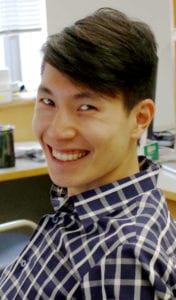Media Contact:
Nalini Padmanabhan
ASHG Communications Manager
301.634.7346
press@ashg.org
For Immediate Release
Thursday, October 8, 2015
10:30 am U.S. Eastern Time (UTC-05:00)
Findings Reported at ASHG 2015 Annual Meeting

BETHESDA, MD – An algorithm using epigenetic information from just nine regions of the human genome can predict the sexual orientation of males with up to 70 percent accuracy, according to research presented at the American Society of Human Genetics (ASHG) 2015 Annual Meeting in Baltimore.
“To our knowledge, this is the first example of a predictive model for sexual orientation based on molecular markers,” said Tuck C. Ngun, PhD, first author on the study and a postdoctoral researcher at the David Geffen School of Medicine of the University of California, Los Angeles.
Beyond the genetic information contained in DNA, the researchers examined patterns of DNA methylation – a molecular modification to DNA that affects when and how strongly a gene is expressed – across the genome in pairs of identical male twins. While identical twins have exactly the same genetic sequence, environmental factors lead to differences in how their DNA is methylated. Thus, by studying twins, the researchers could control for genetic differences and tease out the effect of methylation. In all, the study involved 37 pairs of twins in which one twin was homosexual and the other was heterosexual, and 10 pairs in which both twins were homosexual.
“A challenge was that because we studied twins, their DNA methylation patterns were highly correlated,” Dr. Ngun explained. Even after some initial analysis, the researchers were left with over 400,000 data points to sort through. “The high correlation and large data set made it difficult to identify differences between twins, determine which ones were relevant to sexual orientation, and determine which of those could be used predictively,” he added.
To sort through this data set, Dr. Ngun and his colleagues devised a machine learning algorithm called FuzzyForest. They found that methylation patterns in nine small regions, scattered across the genome, could be used to predict study participants’ sexual orientation with 70 percent accuracy.
“Previous studies had identified broader regions of chromosomes that were involved in sexual orientation, but we were able to define these areas down to the base pair level with our approach,” Dr. Ngun said. He noted that it will take additional research to explain how DNA methylation in those regions may be related to sexual orientation. The researchers are currently testing the algorithm’s accuracy in a more general population of men.
“Sexual attraction is such a fundamental part of life, but it’s not something we know a lot about at the genetic and molecular level. I hope that this research helps us understand ourselves better and why we are the way we are,” Dr. Ngun said.
Presentation: Dr. Ngun will present his research on Thursday, October 8, 2015, from 3:30-3:45 p.m., in Room 309 of the Baltimore Convention Center.
Press Availability: Dr. Ngun will be available to discuss this research with interested media on Friday, October 9, 2015, from 10:00-11:00 a.m., in the ASHG 2015 Press Office (Room 301).
Reference: Ngun TC et al. (2015 Oct 8). Abstract: A novel predictive model of sexual orientation using epigenetic markers. Presented at American Society of Human Genetics 2015 Annual Meeting. Baltimore, Md.
About the American Society of Human Genetics (ASHG)
Founded in 1948, the American Society of Human Genetics is the primary professional membership organization for human genetics specialists worldwide. Its nearly 8,000 members include researchers, academicians, clinicians, laboratory practice professionals, genetic counselors, nurses, and others with an interest in human genetics. The Society serves scientists, health professionals, and the public by providing forums to: (1) share research results through the ASHG Annual Meeting and in The American Journal of Human Genetics; (2) advance genetic research by advocating for research support; (3) educate current and future genetics professionals, health care providers, advocates, policymakers, educators, students, and the public about all aspects of human genetics; and (4) promote genetic services and support responsible social and scientific policies. For more information, visit: http://www.ashg.org.
9650 Rockville Pike | Bethesda, MD 20814 | 301.634.7300 | society@ashg.org | www.ashg.org
Connect with ASHG on Twitter (@GeneticsSociety) | Facebook | LinkedIn
